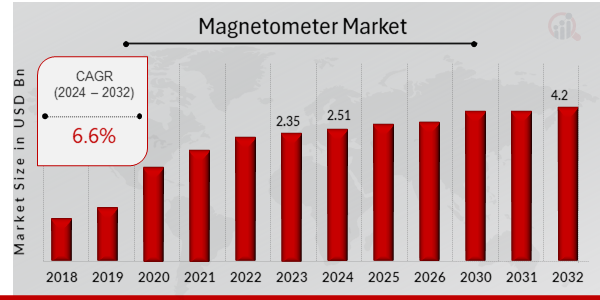
Magnetometer Market Size, Growth, Trends, and Forecast 2032

Magnetometer Market
Magnetometer Market Research Report By Magnetometer Technology Magnetometer Technology, Magnetometer Orientation, Magnetometer Size, Application
AZ, UNITED STATES, February 17, 2025 /EINPresswire.com/ -- Magnetometer Market Overview
The global Magnetometer Market was valued at USD 2.35 billion in 2023 and is projected to grow from USD 2.51 billion in 2024 to USD 4.2 billion by 2032, at a compound annual growth rate (CAGR) of 6.6% during the forecast period (2024-2032). The market is witnessing steady growth due to rising demand in sectors such as aerospace, defense, industrial automation, consumer electronics, and geophysical exploration. Magnetometers are essential for detecting magnetic fields and are widely used in navigation, security screening, medical diagnostics, and mineral exploration.
Key Players in the Market
• Honeywell International Inc.
• Bartington Instruments Ltd.
• VectorNav Technologies, LLC
• Infineon Technologies AG
• Texas Instruments Incorporated
• NXP Semiconductors
• Analog Devices, Inc.
• Asahi Kasei Microdevices Corporation
• STMicroelectronics
• Metrolab Technology SA
Download Sample Pages https://www.marketresearchfuture.com/sample_request/25095
Market Drivers
1. Growing Demand for Navigation Systems
Magnetometers are extensively used in aircraft, ships, submarines, and autonomous vehicles for accurate navigation. With the rising adoption of autonomous vehicles and UAVs (unmanned aerial vehicles), the demand for high-precision magnetometers is increasing.
2. Increasing Adoption in Consumer Electronics
Smartphones, tablets, and wearables integrate magnetometers for compass functionality and augmented reality (AR) applications. The growing penetration of smartphones and wearable technology is driving market growth.
3. Expansion in Geophysical Exploration
The mining and oil & gas industries use magnetometers for mineral and hydrocarbon exploration. With increasing energy demands and mining activities, magnetometers are playing a crucial role in resource detection.
4. Rising Demand in Defense & Security Applications
Military and defense agencies use magnetometers for anti-submarine warfare, detection of buried objects, and perimeter security. Rising investments in defense technology are propelling the market forward.
5. Technological Advancements in Quantum and Atomic Magnetometers
The development of quantum and atomic magnetometers is enhancing the sensitivity and precision of magnetic field detection. These advancements are expanding the applications of magnetometers in biomedical research, space exploration, and quantum computing.
Browse In-depth Market Research Report: https://www.marketresearchfuture.com/reports/magnetometer-market-25095
Market Segmentation
By Type
1. Scalar Magnetometers – Measure the total strength of the magnetic field and are widely used in geophysical surveys.
2. Vector Magnetometers – Detect the direction of the magnetic field and are used in aerospace, navigation, and industrial applications.
3. Optically Pumped Magnetometers – High-precision devices used in defense, medical imaging, and space applications.
4. Fluxgate Magnetometers – Commonly used in navigation systems, industrial monitoring, and military applications.
By Application
1. Consumer Electronics – Integrated into smartphones, tablets, and smartwatches for navigation and augmented reality applications.
2. Aerospace & Defense – Used in aircraft navigation, submarine detection, and space missions.
3. Industrial & Automotive – Deployed in industrial automation, electric vehicles (EVs), and robotics for motion sensing and positioning.
4. Geophysical Exploration – Used for mineral, oil, and gas exploration, as well as earthquake prediction.
5. Medical & Healthcare – Applied in magnetoencephalography (MEG) and MRI (magnetic resonance imaging) for diagnostic purposes.
By Technology
1. Hall Effect Magnetometers – Widely used in automotive and industrial applications for proximity sensing and speed measurement.
2. MEMS-Based Magnetometers – Miniaturized sensors used in IoT (Internet of Things) devices and consumer electronics.
3. SQUID (Superconducting Quantum Interference Device) Magnetometers – Extremely sensitive magnetometers used in medical imaging and scientific research.
4. NMR (Nuclear Magnetic Resonance) Magnetometers – Used for precise measurement of weak magnetic fields in laboratory applications.
By Region
1. North America – Dominates the market due to strong demand from the aerospace, defense, and consumer electronics sectors.
2. Europe – Significant market growth driven by advancements in quantum sensing and defense applications.
3. Asia-Pacific – The fastest-growing region, fueled by rising smartphone adoption, automotive innovations, and increasing industrial automation.
4. Rest of the World (RoW) – Moderate growth expected in Latin America, the Middle East, and Africa, particularly in mining and exploration activities.
Procure Complete Research Report Now: https://www.marketresearchfuture.com/checkout?currency=one_user-USD&report_id=25095
Key Market Trends
1. Miniaturization of Magnetometers
The demand for compact and energy-efficient magnetometers is increasing in wearable devices, smartphones, and IoT applications. MEMS-based magnetometers are gaining traction due to their small size and low power consumption.
2. Integration with AI and Machine Learning
Artificial intelligence (AI) and machine learning are being integrated with magnetometers to enhance data interpretation and improve detection accuracy in defense, healthcare, and industrial applications.
3. Expansion of Electric Vehicles (EVs) and Autonomous Systems
Magnetometers are crucial for positioning and navigation in autonomous vehicles and EVs. The growing adoption of self-driving cars and smart transportation is creating new opportunities for market growth.
4. Rising Investments in Space Exploration
Space agencies like NASA, ESA, and ISRO are increasingly using magnetometers in spacecraft, planetary exploration missions, and satellite navigation. The demand for high-precision space-grade magnetometers is on the rise.
5. Advancements in Quantum Magnetometers
Quantum magnetometers, which provide ultra-sensitive magnetic field detection, are finding applications in biomedical imaging, security screening, and fundamental physics research.
Challenges in the Market
1. High Cost of Advanced Magnetometers
Quantum and optically pumped magnetometers are expensive, limiting their adoption in cost-sensitive applications.
2. Complex Manufacturing Process
Developing high-precision magnetometers involves complex manufacturing and calibration processes, which can increase production costs.
3. Sensitivity to Environmental Factors
Magnetometers can be affected by temperature changes, electromagnetic interference, and external disturbances, which may impact their accuracy.
Related Reports:
luminaire lighting control market
microelectronics cleaning equipment market
Sagar kadam
WantStats Research and Media Pvt. Ltd.
+91 95953 92885
email us here
Distribution channels: Technology
Legal Disclaimer:
EIN Presswire provides this news content "as is" without warranty of any kind. We do not accept any responsibility or liability for the accuracy, content, images, videos, licenses, completeness, legality, or reliability of the information contained in this article. If you have any complaints or copyright issues related to this article, kindly contact the author above.
Submit your press release